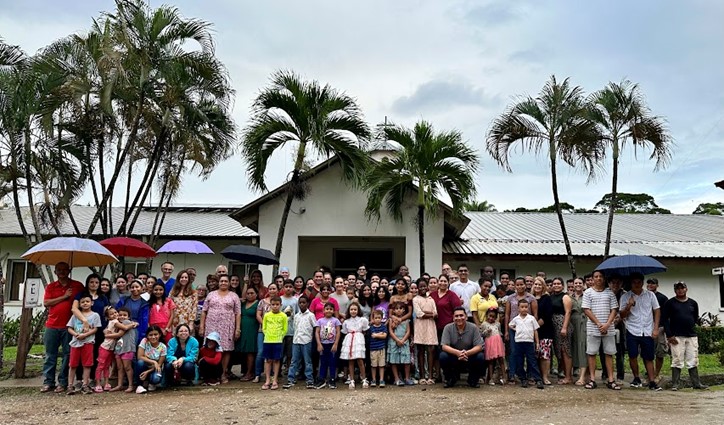… And Mary said, “My soul doth magnify the Lord, and my spirit hath rejoiced in God my Savior. For He hath regarded the low estate of His handmaiden; for behold, from henceforth all generations shall call me blessed.
—Luke 1:46-48
The leaden sky implacable denies the sun’s domain,
While we below seek to and fro some shelter from the rain.
It has been an intractable, relentlessly tempestuous, cats-and-dogs kind of rainy season on the North coast here so far. Our clothes stay damp, our shoes stay sodden, the ruined road stays near impassable. Perhaps he was exaggerating, but someone swore he saw the chauffeur of a bus hopelessly stuck axle deep in the road staring out into the rain and shaking his head while a family of ducks swam by. Still, many patients somehow find a way to the hospital. There was an elderly man walking “descalzo” (barefoot) around the hospital one storm-wracked day a couple of weeks ago. Walking the road on the way to the hospital, his “chancletas” (flip flops) had been sucked off his feet so deep in the mud he couldn’t find them. While barefoot in public may be some badge of honor for a hip flower child from a privileged developed-nation culture, among the poor it is somewhere between embarrassing and shameful.
Yet no one in the hospital rolled their eyes or pointed. Instead, before the end of the day, Adrian had given him his shoes, and the response making its way around the hospital was one of those typically Honduran self-deprecating observations: “In the spring when they work on the roads, ‘si Dios quiere’ [if God wills], we’ll probably find a mountain of our shoes again.”
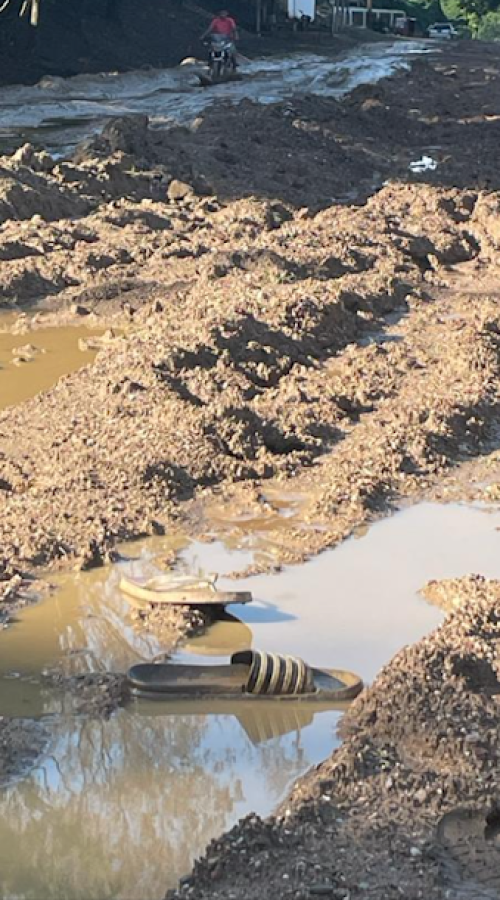
We recently were up in the USA, and typically travelling a lot. I’m always amazed by and grateful for how excellent are the roads of that great nation. I drove thousands of miles of backroads through the countryside, and nowhere did I even have to slow down (except for the traffic cameras or rush-hour traffic). Certainly, nowhere did I get bogged down in the mire, or even have to put it in FWD… much less lose my chancletas in the mud. But I did get a strong sense of cultural drift on this most recent window into the American landscape, most profoundly in the cities. It’s difficult to put your finger on just what is changing so rapidly, but part of it definitely seemed to be a disconnection from each other: more tribal separation, more isolation from the next man on the street who studiously avoids meeting your eye, more skin-deep self-sufficiency, more separation from an awareness of one’s real needs and from God. I still met a lot of salt of the earth people. But so many strangers seemed a little colder, a little sadder. The shopping malls and grocery stores and airports and rental car agencies just seemed so automated and sterile. That cultural shift was made all the more conspicuous in comparison when I returned to the vibrancy of a culture not nearly so proud, so self-sufficient, or so fractured.
In San Pedro Sula, the obligatory baggage guy required to get you through customs left us his cart outside saying “you’ll need it for all that luggage.” When I asked the woman at the Baleadas Express if she had anything other than cokes to drink, she leaned over, put her hand on my hand and said conspiratorially, “un aguaita solamente” (just a little plain old bottle of water). At the Café Americano, they didn’t have any hot coffee made, so the girl made a fresh pot… very slowly. Since there were no other customers waiting, the three other girls behind the counter joined in, keeping her company while the coffee brewed. I had a four-hour layover, so I didn’t mind… and as I stood there, they included me in their conversation, arms over each other’s shoulders, chatting about their kids, customers, and the manager. This doesn’t exactly qualify as a model for ‘best practices in business efficiency,’ but it fit with all of the other interactions mentioned so far, only two hours into my return. There was a deeply meaningful common thread in all of these interactions. That common ground was an humbly accepted truth: “We’re all poor, so we’re all in this together.” The hierarchy of value paradigms of that shared humility was sharply in contrast to the tribally divided schoolyard I had just left ‘en El Norte.’ We reached La Ceiba later that day, in an aircraft much more humble. But the notable distinction was not the vintage of the aircraft; we got there just the same. It was:
1.) the absence of the endless overhead “safety” & advertising announcements (there were none),
2.) that the passengers applauded when we landed, and
3.) the pilot walked across the tarmac, talking with the passengers like a regular guy.
Across town & heading out into the countryside, on the eastern edge of La Ceiba, we pulled to the side of the road at the best roadside chicken stand to take something prepared there home for supper. It would be well after dark before we got there. We noticed that they had a new sign (where the place had never even had a name before as far as anyone could tell). The new signage now proudly declares the stand to be called “El Primo” (The Cousin). Rosanne asked the lady working the grill where the name came from. She said, “Oh, you know, everybody who pulls over here calls out ‘Oi Primo, deme la mitad!’ or ‘Oi Primo, un entero por favor’ (‘Hey Cousin, I’ll take a half [chicken]’or ‘Hey Cousin, a whole one please’), so we just went with that.” Of course. Make’s sense. You wouldn’t want to take yourself too seriously. We’re all just cousins here.
A couple of days later I was back in the hospital writing orders late in the evening when it was quiet on the wards. While I wrote, one of the nurses at the nurses’ station was asking me about how dangerous was a hernia. Those indirect, third person questions generally mean the questioner wants to ask about their particular medical issue, so I just cut to the chase and asked, “Do you have a hernia?” Without a thought about propriety or her own personal space she lifted her uniform top to show me her umbilical hernia…. With the other nurses looking on and nodding, one with her hand on the other’s shoulder, all in solidarity with their coworker’s hernia, and no one seemed to think it odd that she wasn’t guarding her dignity. Sure. We all have defects of course.
It doesn’t take long to fit back into a well-worn saddle. Within a few days it seemed as if we’d been here for decades, which I guess we have. But I was paying a little more attention to this aspect of the Honduran cultural personality, the innate tendency toward humility. When people want to express their gratitude they always say, “A Dios, primero, despues a Usted le doy gracias” [“I give thanks first to God, then to you”]. When you discuss a plan, like, “I’ll see you in two weeks,” unless you say it first, the response is always “si Dios quiere.” (God willing). In the US we used to say things like, “I’ll see you in two weeks, God willing.” When did we stop?
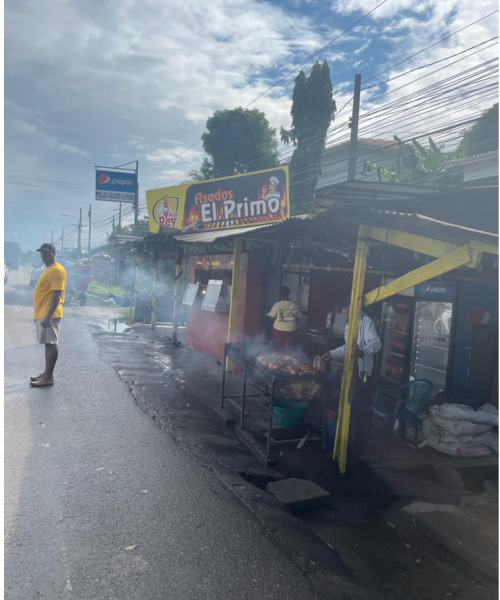
Please don’t misunderstand me, I am not praising one culture or criticizing another. I’m recognizing the value of humility. Considering that everyone ever born is humbled sooner or later, it is a good and reasonable sense for humans to walk in. And, it is an attitude which God clearly values, He who “opposes the proud, but gives grace to the humble”
When He saw fit to bridge that great gulf between God and man to make himself vulnerable and walk among us, He didn’t exempt himself. “But made himself of no reputation, and took upon him the form of a servant, and was made in the likeness of men” (Phil. 2:7). He wasn’t born a Roman emperor, or an Anglo Saxon King, or a Mongol Khan. He could have come as any of these. I mean He who, “In the beginning was the Word, and the Word was with God, and the Word was God. He was with God in the beginning. Through him all things were made; without him nothing was made that has been made.”
(John 1:1-3)… with that kind of power and preeminence He could have come as anything.
He came as the most helpless and humble of creatures, a newborn baby, born in a stable, no less, whose earthly parents were peasants, a young girl and a carpenter from an obscure little village in an obscure little country on the far fringes of civilization, such as civilization was 2,000 years ago. They weren’t even secure in their home but were travelers on the road, with no money and no place to stay. A beginning doesn’t get much more humble than this. But are there any words more powerful and hopeful than “For unto us a child is born”?
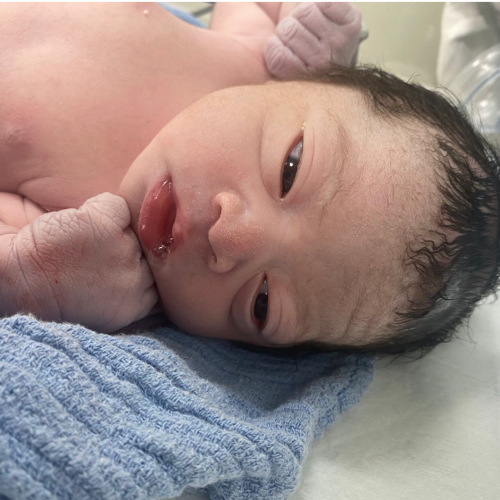
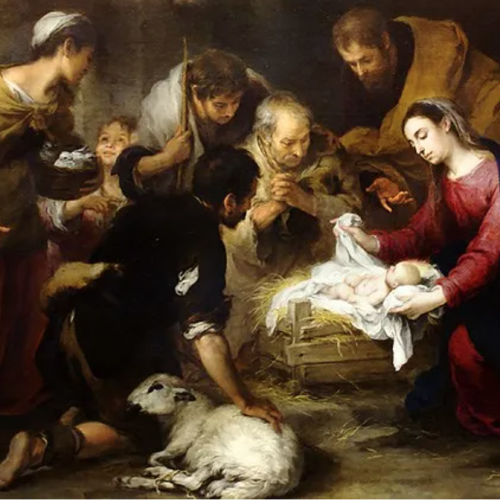
We can only stand in awe at the wisdom of this. Particularly in this season, even if all around us forget, we should not. In humility and gratitude let us join that great “multitude of the heavenly host praising God, and saying, Glory to God in the highest, and on earth peace, good will toward men” (Luke 2: 13,14).
In the shadow of the Savior,
Jefferson McKenney, M.D.
News and Needs
1 – Kelsey McKenzie and his wife Dra. Jennifer Mejia are good friends and incoming National (Honduran) Cornerstone Missionaries. Kelsey is scheduled to be the Loma de Luz Chaplain, and Jennifer a medical missionary to begin at Loma de Luz in January 2024. Kelsey and Jennifer were up in the USA, visiting supporters and taking care of some US State Department paperwork. Their children, Ainee, 7 years old, & James, 2 years old, are staying in La Ceiba with grandparents.
Kelsey and Jennifer were planning to be in the US for about 2 months when unexpectedly, Kelsey’s underlying kidney disorder drastically worsened, and Kelsey went into complete renal failure. He is now waiting in Georgia to see if there is any potential for him to receive a renal transplant. The Cornerstone Foundation’s Prayer Chain has been praying for them, but we wanted to broaden the scope of our prayer request for Kelsey, Jennifer, and their kids. Being a wayfarer in a foreign country, separated from your children, feeling sick and worrying about your family, in complete renal failure and needing a kidney transplant … is a frightening place to be. Please hold them up in prayer for God’s best provision, for courage and peace.
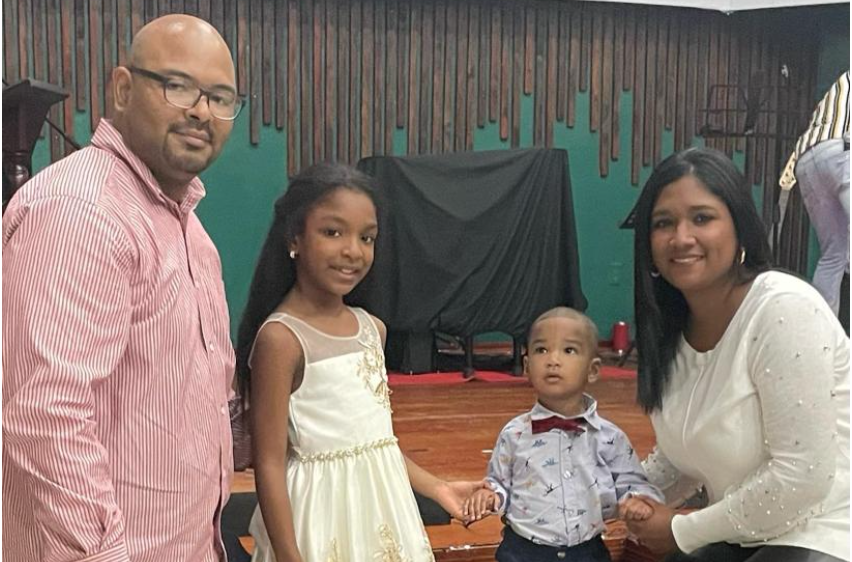
2- Tom, a friend and former Loma de Luz Missionary, has also recently been on the Cornerstone Foundation’s prayer chain, with some very worrisome findings on chest Xray and CT scan, suggestive of cancer. Just by way of follow-up, a PET scan and subsequent CT have now shown surprising resolution (which still bears watching). Thank you for your prayers, and please keep praying.
3- Email Prayer Alert Group If you would like to join this group, please let us know (email Sally at [email protected] with a cc to [email protected]).
4- The Cornerstone Foundation is sending a shipping container full of roughly $250,000 worth of needed materials and supplies and equipment to Loma de Luz. It also includes important Christmas presents for kids and staff. Its scheduled sailing date is 12 December. Please pray it is not held up by bureaucratic inefficiency, arbitrary obstructive inspections, graft, or weather…. So that it arrives to be unloaded on time before Christmas.
People
As we grow and people move on, you may know that we are perpetually in need of more great teachers at El Camino Bilingual School. Just a casual conversation recently motivated someone to connect the school with 2 teachers looking for a place to serve. We hope they do. If you know of a teacher who would be willing to give a little up for that ‘Babe in a Manger’ who came that we “might have life, and life more abundantly,” please connect them with our Volunteer Coordinator at [email protected]. We are also in need of just the right mature and fully trained Primary Care Physician, just the right Construction Maintenance Supervisor, and just the right Surgeon for Hospital Loma de Luz. Please keep that in mind and in prayer as well.
THANKS
Please also join us in thanking the Lord for many things and many people. Thank Him for the great blessing that Mike and Peggy Yost have been for so many years at Loma de Luz (they are retiring, so please pray that they will in turn be very blessed). We are thankful too for Kathleen Jones, who has stepped in and increased her work at the Cornerstone office while we wait for new office personnel. We are thankful for the Honduran national missionaries and staff in all the areas of ministry at Loma de Luz. We are thankful for the favor given the school and for the encouraging signs regarding the waning and likely dissolution of the land invasion.

“Born to raise the sons of earth,” says Charles Wesley in his carol about the newborn in Bethlehem. The world is so often a very dark place… unstable, violent, beleaguered. We sons (and daughters) of earth need that raising up—not only regarding heaven in the future, but now, having within us a different kind of life, one smuggled into our world by a child who was the Life and Light of men.
–Sally Mahoney for the Cornerstone Foundation
